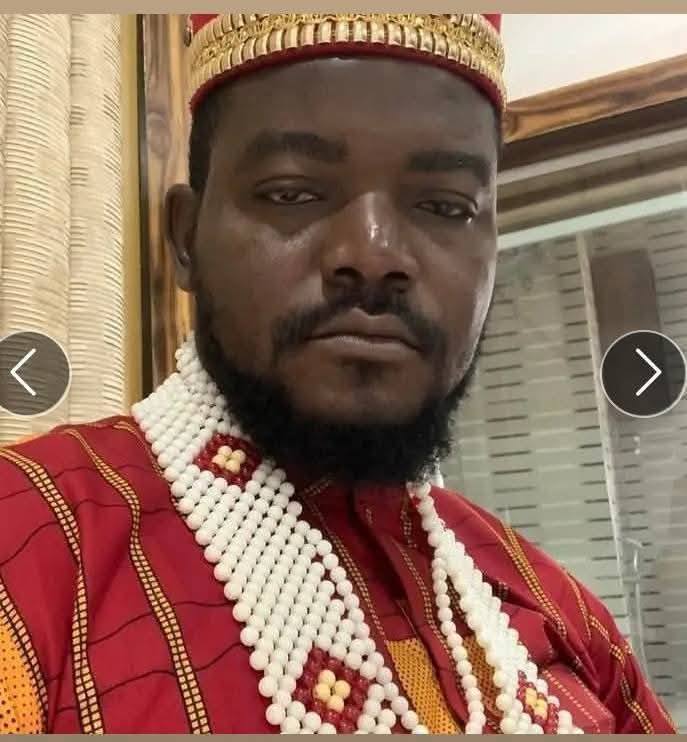From Healer to K!ller: Inside the Arrest of Enugu’s Most Fe3red Native Doctor After Pit of Hum@n Rem@ins Found in Shrine
A tranquil agrarian community in Ezeagu Local Government Area of Enugu State has been jolted by a horrific discovery that has sent shockwaves across Southeastern Nigeria. A man known by many as a revered traditionalist — a native doctor and the self-proclaimed Ezeani of Umuojor kingdom — has been unmasked as the alleged mastermind of a gruesome syndicate specializing in kidnappings, ritual killings, and the harvesting of human body parts.
The suspect, whose real name has not been officially confirmed at the time of this report, had operated for years under the guise of traditional healing, amassing wealth and influence while receiving veneration from locals and outsiders alike. But his web of darkness unraveled in dramatic fashion over the weekend when his errand boys were apprehended in the act — preparing a young girl for ritual slaughter.
What followed was a storm of revelations, a night of rage, and a long-overdue reckoning.
According to sources in Umumba Ndiagu, the breakthrough came on Friday night, when a group of vigilante youths on routine patrol intercepted two young men acting suspiciously near a footpath leading into a dense bush behind the compound of the native doctor. Upon searching their bags, the patrol team made a terrifying discovery — a young girl, gagged and bound, with signs of having been sedated, was found in a sack.
Further questioning and physical intimidation reportedly forced the suspects to confess. They named their employer — the same man known for flamboyant displays of wealth and spiritual might — as the brain behind their activities. They admitted they were on their way to his shrine, where she was to be slaughtered in a midnight ritual.
YOU MAY READ
Popular Anambra Native Doctor , Akwa Okuko Arrested, Denies Oké-Ite Charm Practice, Detained for Further Investigation by Anambra State Government
In the early hours of Saturday, hundreds of enraged youths, armed with sticks, machetes, and chants of justice, stormed the compound of the so-called Ezeani. But the man who had long styled himself as an untouchable spiritual monarch was nowhere to be found. He had fled minutes before their arrival, allegedly tipped off by insiders.
However, what the crowd found in his wake was chilling beyond imagination.
Behind his grandiose compound stood a fenced-off area, previously assumed to be a private garden. Inside it lay a large pit, partially covered with rusted roofing sheets. When the youths pulled off the covers, the stench was overpowering.
Inside the pit, they found decomposed human remains — bones, skulls, and severed limbs, piled atop one another in layers that told of years of repeated disposal. Some bodies were found in partial decay, others clearly mutilated — parts missing, heads separated.
“It was like a horror movie,” said Chike Ugwoke, a local teacher who joined the raid. “We could not believe this was happening in our town. We have lived with a monster, eating and dancing with him. And he was killing us.”
By Sunday morning, officers from the Ezeagu Divisional Police Headquarters arrived at the scene. They cordoned off the area and began preliminary investigations, while crime scene analysts from Enugu were deployed to gather forensic evidence. At the time of this report, the Enugu State Police Command has yet to release an official statement, but officers on the ground confirmed the arrest of at least four suspects, including the two errand boys and two adult males found in the compound.
Investigations are expected to widen in the coming days, with the hunt for the prime suspect now extending across state lines. A manhunt has been declared, and residents are being urged to report any sightings.
“This is not just a murder case,” a senior officer who requested anonymity told this reporter. “This is a mass grave, a ritual slaughterhouse, and we suspect the existence of a broader network of collaborators and clients.”
Locals who spoke to journalists expressed a mix of shock and guilt. Many had once hailed the suspect for his supposed benevolence — handing out foodstuffs during the New Year, sponsoring community football tournaments, and “helping the sick” through herbal remedies. Yet behind the public displays of generosity was a sinister lifestyle — unexplained affluence, expensive SUVs, and a fortress-like home watched over by armed guards and juju icons.
YOU MAY READ
Anambra State Government Seals Church Allegedly Linked to Oke Ite Practice in Nkpor
“He used to throw money in the air during festivals,” said Ifeoma Ede, a hairdresser. “We just thought he was lucky or spiritually powerful. Nobody imagined this was where the money came from.”
Several neighbors recalled the periodic cries of pain or chants that echoed from the shrine at odd hours — but no one dared to question him.
“You question Ezeani, and you die mysteriously the next week,” one elderly man whispered, crossing himself. “We were living in fear. He used power to silence us.”
Among the most tragic elements of this story are the dozens of missing persons cases in Ezeagu and surrounding LGAs over the past five years. Many families had reported loved ones — especially children, teenagers, and market women — vanishing without trace. In nearly every instance, no credible leads were established, and investigations quickly went cold.
But now, a grim theory is forming: Were they all victims of the so-called Ezeani?
The family of Chidinma, a 16-year-old girl who went missing in January 2024 on her way back from school, has spoken out. Her school shoes and tattered uniform were among the items recovered near the shrine. DNA tests are pending, but the family fears the worst.
“There were rumors then, but we never suspected him,” said her father, Mazi Ifeanyi. “We will never forgive him. He murdered our daughter and desecrated our land.”
This case has reignited long-standing debates over the blurry line between traditional spirituality and criminality. In many communities across the Southeast, native doctors still wield tremendous power and influence. They are called upon to perform rites, resolve conflicts, or act as intermediaries with the ancestral realm.
But critics argue that the reverence for such figures has, in some cases, shielded malevolent actors from scrutiny.
“There is nothing wrong with Igbo traditional religion,” said Professor Jide Okoye, an anthropologist at the University of Nigeria, Nsukka. “But what we see here is criminality disguised as culture. Killing people, harvesting body parts, and invoking the gods as justification is an abomination — not tradition.”
Many are calling for a statewide audit of all shrines, traditional healing centers, and spiritual camps operating in Enugu.
“We must separate the sacred from the satanic,” said Hon. Ifunanya Ugwu, a member of the Enugu State House of Assembly. “This is not about culture; it is about mass murder.”
As video footage of the mass grave, the rescued girl, and interviews with locals began circulating on social media, reactions from across Nigeria poured in. The link to the footage, shared on Facebook (see here), has sparked hundreds of thousands of views and comments.
“This is evil in broad daylight,” wrote one commenter. “We must stop worshipping people just because they have money or power.”
Others reflected on the disturbing trend of societal reverence for sudden wealth, regardless of its source.
“How can someone who doesn’t work but spends money like a billionaire not be questioned?” asked another. “We glorify blood money in this country.”
Several users expressed fear that other communities might be harboring similar monsters under the veil of tradition, calling on security agencies and traditional rulers to act decisively.
This tragic case is just the latest in a string of ritual killings that have rocked Nigeria in recent years. In states like Ogun, Anambra, Delta, and now Enugu, reports of body parts being harvested for spiritual or financial gain have surfaced with disturbing frequency.
Experts point to a toxic combination of poverty, unemployment, failed justice systems, and cultural superstition as driving forces behind the phenomenon.
“Young people are being lured into deadly cults,” said Dr. Chinelo Anazodo, a sociologist. “They are told that money can be conjured through sacrifice. This is spiritual manipulation, and it thrives in a society where education, law, and values have collapsed.”
The Nigerian Police and National Orientation Agency have in the past launched public campaigns against ritual killings, but many believe enforcement remains weak and selective.
Last night, Governor Mba ordered demolition of all his building
“This is the time for the government to prove it values rural lives,” said activist Obiageli Eze, founder of Enugu Women for Justice. “This man was known. People warned. Yet he thrived. We need answers.”
As dusk settles over Umuojor, the compound of the fallen Ezeani remains under police guard — a site of death, betrayal, and shattered illusions. In the coming days, more horrors may be unearthed. Names of the dead will be spoken again. And the community will begin the long process of healing and cleansing.
But one message rings louder than any ritual chant or native drumbeat: Never again.
Evil may hide in robes of tradition, but truth, however long suppressed, will always find its way to the surface — just as that young girl, minutes from slaughter, was saved. Her scream, silenced by a gag, has now become a national outcry.
If you have any information that may assist security agencies in locating the fugitive or identifying more victims, please contact the nearest police station or the Enugu State Command.
📺 Watch the video of the incident and community outrage here:
👉 https://www.facebook.com/share/p/1AuTnnivmv/





